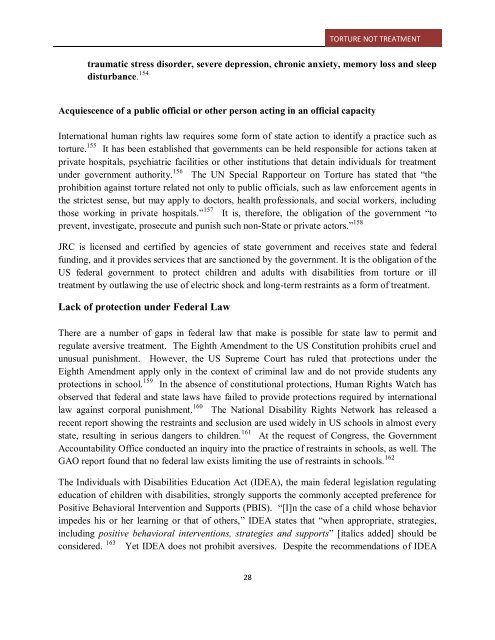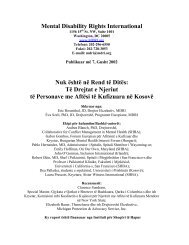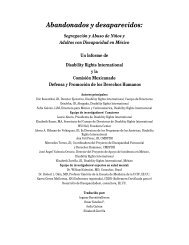Torture not Treatment - Disability Rights International
Torture not Treatment - Disability Rights International
Torture not Treatment - Disability Rights International
You also want an ePaper? Increase the reach of your titles
YUMPU automatically turns print PDFs into web optimized ePapers that Google loves.
TORTURE NOT TREATMENT<br />
traumatic stress disorder, severe depression, chronic anxiety, memory loss and sleep<br />
disturbance. 154<br />
Acquiescence of a public official or other person acting in an official capacity<br />
<strong>International</strong> human rights law requires some form of state action to identify a practice such as<br />
torture. 155 It has been established that governments can be held responsible for actions taken at<br />
private hospitals, psychiatric facilities or other institutions that detain individuals for treatment<br />
under government authority. 156 The UN Special Rapporteur on <strong>Torture</strong> has stated that ―the<br />
prohibition against torture related <strong>not</strong> only to public officials, such as law enforcement agents in<br />
the strictest sense, but may apply to doctors, health professionals, and social workers, including<br />
those working in private hospitals.‖ 157 It is, therefore, the obligation of the government ―to<br />
prevent, investigate, prosecute and punish such non-State or private actors.‖ 158<br />
JRC is licensed and certified by agencies of state government and receives state and federal<br />
funding, and it provides services that are sanctioned by the government. It is the obligation of the<br />
US federal government to protect children and adults with disabilities from torture or ill<br />
treatment by outlawing the use of electric shock and long-term restraints as a form of treatment.<br />
Lack of protection under Federal Law<br />
There are a number of gaps in federal law that make is possible for state law to permit and<br />
regulate aversive treatment. The Eighth Amendment to the US Constitution prohibits cruel and<br />
unusual punishment. However, the US Supreme Court has ruled that protections under the<br />
Eighth Amendment apply only in the context of criminal law and do <strong>not</strong> provide students any<br />
protections in school. 159 In the absence of constitutional protections, Human <strong>Rights</strong> Watch has<br />
observed that federal and state laws have failed to provide protections required by international<br />
law against corporal punishment. 160 The National <strong>Disability</strong> <strong>Rights</strong> Network has released a<br />
recent report showing the restraints and seclusion are used widely in US schools in almost every<br />
state, resulting in serious dangers to children. 161 At the request of Congress, the Government<br />
Accountability Office conducted an inquiry into the practice of restraints in schools, as well. The<br />
GAO report found that no federal law exists limiting the use of restraints in schools. 162<br />
The Individuals with Disabilities Education Act (IDEA), the main federal legislation regulating<br />
education of children with disabilities, strongly supports the commonly accepted preference for<br />
Positive Behavioral Intervention and Supports (PBIS). ―[I]n the case of a child whose behavior<br />
impedes his or her learning or that of others,‖ IDEA states that ―when appropriate, strategies,<br />
including positive behavioral interventions, strategies and supports‖ [italics added] should be<br />
considered. 163 Yet IDEA does <strong>not</strong> prohibit aversives. Despite the recommendations of IDEA<br />
28




